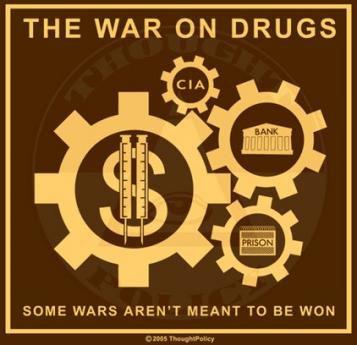Is the Destructive Drug War Being Brought to an End?

Making positive change often seems impossible, but one area that should give people hope is the movement toward ending the war on drugs.
When I was in law school in the late 1970s, I did an internship at NORML, where one of my tasks was responding to mail from marijuana prisoners and their families. The harsh injustice of the drug war struck me then, and ever since I’ve been working to end the war on drugs — a war declared by Richard Nixon.
Majorities now support the outright legalization of marijuana and oppose the war on drugs. The public has overcome decades of misinformation to justify the drug war.
The transformation struck me a few years ago when I was in a medical marijuana dispensary in California. In 1996, California became the first state to legalize medical marijuana. At the dispensary, people lined up — as if they were waiting for a bank teller — in a safe place to get medical-quality marijuana. The slogan of the Harborside Health Center was “out of the darkness and into the light.”
That slogan is true on many levels. Not only are people who were criminals able to come out into the light and purchase their medicine in a safe environment, but the nation is coming out of the darkness of false information. In May of 2013, the Green Shadow Cabinet recommended the Obama administration allow state marijuana legalization to go forward, eight months later Attorney General Holder did just that.
Now, the light is shining on former drug war assertions, and claims like the one that marijuana causes crime are being proven false. Since the legalization of marijuana in Colorado, violent crime has fallen by 6.9 percent and property crime by 11.1 percent. A 2012 study, “California Youth Crime Plunges to All-Time Low,” credits a state marijuana decriminalization for plummeting arrests for all crimes. Meanwhile, anApril 2014 study shows that legalization does not lead to increased adolescent use.
In addition, tremendous revenues are coming into Colorado from marijuana taxes.Colorado’s Joint Budget Committee projects revenue of $610 million from retail and medical marijuana sales from January 1, 2014 to June 30, 2015, the end of the next fiscal year. And, the state is saving money on enforcement. The Denver Post reported“the number of cases filed in state court alleging at least one marijuana offense plunged 77 percent between 2012 and 2013.”
The lessons from Colorado: decreased crime, no increased use, tremendous law enforcement savings and massive new revenues. Ending marijuana prohibition has been a success on many levels.
There is an awakening regarding other drugs as well. President Obama, who has pardoned fewer prisoners than any other president, has announced he may pardon hundreds, if not thouands of drug offenders. This is occurring after the Department of Justice removed pardon attorney, Ronald Rodgers, a career drug enforcement official who provided false information in order to prevent pardons.
Granting clemency to thousands is not enough. The DOJ guidelines for pardons are extremely stringent (e.g. a person must have served at least 10 years to be considered); many tens of thousands who should be released will not be. More systemic change is needed, the country needs to change its sentencing laws and continue to dismantle the drug war.
Since the ‘Just Say No’ era of the 1980s, both parties outdid themselves to see who could be tougher on drugs. Vice President Biden, for example, chaired the Judiciary Committee when harsh mandatory minimum sentencing became law. Eric Holder has recently highlighted, “since 1980, the federal prison population has grown at an astonishing rate — by almost 800 percent.” The United States needs to face up to the injustice that with just 5 percent of the world’s population, the U.S. has 25 percent of the world’s prisoners. That’s right, one in four of the world’s prisoners live behind bars in the “land of the free.”
By every measure the drug war has failed and done incredible harm. The U.S. has spent $1 trillion on it but illegal drugs are cheaper, addiction rates remain the same and overdose deaths are rising. One positive step is the “Smarter Sentencing Act” which removes mandatory sentencing for some offenders and reduces them for others. This bi-partisan bill will save money, improve public safety, reduce overcrowding in federal prisons, and begin to undo unproductive mandatory minimum sentences.
There continues to be resistance to reform from those whose careers and livelihoods depend on the failed drug war. Just as the Obama administration removed pardon attorney Ronald Rogers, the President needs to remove the current DEA Administrator Michelle Leonhart. She is refusing to support the Smarter Sentencing Act, supported by Obama. She criticized the president for saying marijuana is no more dangerous than alcohol and opposed the Obama administration’s decision to let reform in Colorado and Washington go forward. She is out of step with the administration and needs to be removed.
An awakening is occurring, the U.S. is finally getting on the right path, people need to take advantage of the opportunity and push now to end the drug war.

